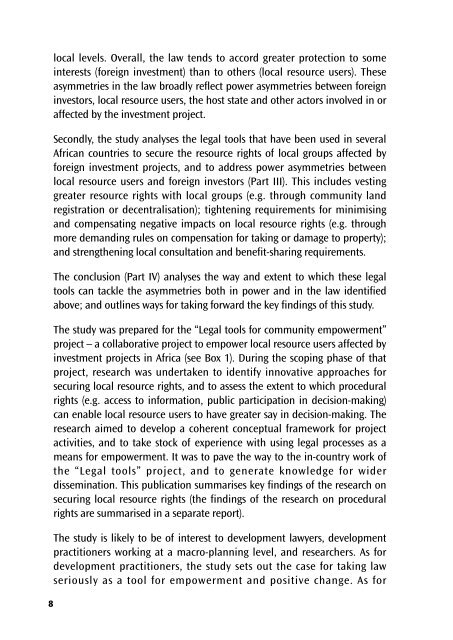Legal empowerment for local resource control
Legal empowerment for local resource control
Legal empowerment for local resource control
Create successful ePaper yourself
Turn your PDF publications into a flip-book with our unique Google optimized e-Paper software.
8<br />
<strong>local</strong> levels. Overall, the law tends to accord greater protection to some<br />
interests (<strong>for</strong>eign investment) than to others (<strong>local</strong> <strong>resource</strong> users). These<br />
asymmetries in the law broadly reflect power asymmetries between <strong>for</strong>eign<br />
investors, <strong>local</strong> <strong>resource</strong> users, the host state and other actors involved in or<br />
affected by the investment project.<br />
Secondly, the study analyses the legal tools that have been used in several<br />
African countries to secure the <strong>resource</strong> rights of <strong>local</strong> groups affected by<br />
<strong>for</strong>eign investment projects, and to address power asymmetries between<br />
<strong>local</strong> <strong>resource</strong> users and <strong>for</strong>eign investors (Part III). This includes vesting<br />
greater <strong>resource</strong> rights with <strong>local</strong> groups (e.g. through community land<br />
registration or decentralisation); tightening requirements <strong>for</strong> minimising<br />
and compensating negative impacts on <strong>local</strong> <strong>resource</strong> rights (e.g. through<br />
more demanding rules on compensation <strong>for</strong> taking or damage to property);<br />
and strengthening <strong>local</strong> consultation and benefit-sharing requirements.<br />
The conclusion (Part IV) analyses the way and extent to which these legal<br />
tools can tackle the asymmetries both in power and in the law identified<br />
above; and outlines ways <strong>for</strong> taking <strong>for</strong>ward the key findings of this study.<br />
The study was prepared <strong>for</strong> the “<strong>Legal</strong> tools <strong>for</strong> community <strong>empowerment</strong>”<br />
project – a collaborative project to empower <strong>local</strong> <strong>resource</strong> users affected by<br />
investment projects in Africa (see Box 1). During the scoping phase of that<br />
project, research was undertaken to identify innovative approaches <strong>for</strong><br />
securing <strong>local</strong> <strong>resource</strong> rights, and to assess the extent to which procedural<br />
rights (e.g. access to in<strong>for</strong>mation, public participation in decision-making)<br />
can enable <strong>local</strong> <strong>resource</strong> users to have greater say in decision-making. The<br />
research aimed to develop a coherent conceptual framework <strong>for</strong> project<br />
activities, and to take stock of experience with using legal processes as a<br />
means <strong>for</strong> <strong>empowerment</strong>. It was to pave the way to the in-country work of<br />
the “<strong>Legal</strong> tools” project, and to generate knowledge <strong>for</strong> wider<br />
dissemination. This publication summarises key findings of the research on<br />
securing <strong>local</strong> <strong>resource</strong> rights (the findings of the research on procedural<br />
rights are summarised in a separate report).<br />
The study is likely to be of interest to development lawyers, development<br />
practitioners working at a macro-planning level, and researchers. As <strong>for</strong><br />
development practitioners, the study sets out the case <strong>for</strong> taking law<br />
seriously as a tool <strong>for</strong> <strong>empowerment</strong> and positive change. As <strong>for</strong>

















